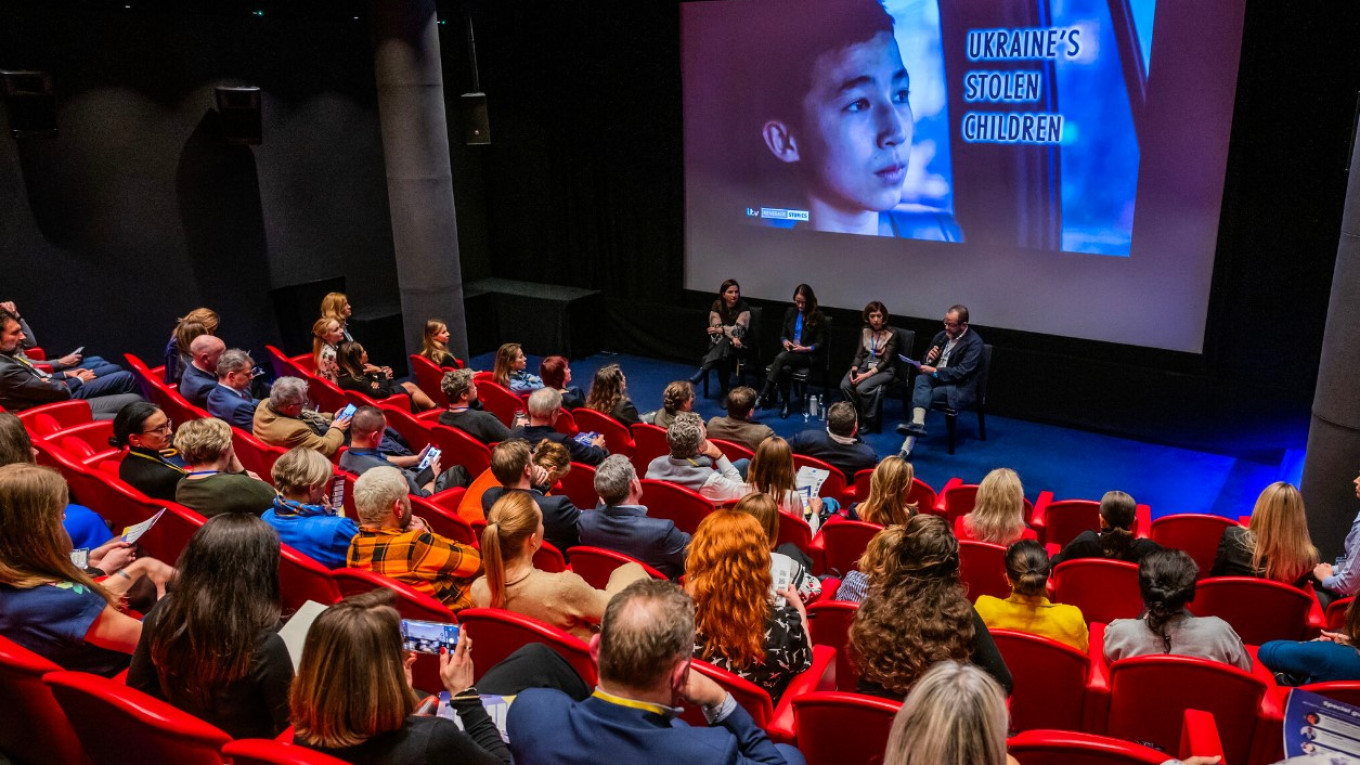A special screening of Shahida Tulaganova’s film “Ukraine’s Stolen Children” drew large audiences in London. The film is an exploration of one of the most insidious practices of Russia’s war: the mass abduction of children from occupied territory for adoption by Russian families.
Veteran war correspondent Tulaganova has won multiple awards for her films, including “Airport Donetsk” and “Cries from Syria.” She focuses on the lives of ordinary people in wartime, especially women and children.
The hour-long film, produced for UK channel ITV, follows a group of Ukrainian mothers in their quest to bring their children home from Russia. It’s a sensitive production, impossible to make without the the director’s trusted relationship with her subjects. The mothers blame themselves for their unwitting role in the kidnapping of their children. Many many were persuaded to send their children away to the temporary “safety” of Russian holiday camps, from which they were unable to return.
Fourteen-year-old Diana was taken to Russia with her two younger siblings for a fortnight’s “holiday” that turned into six months. She described the camp, where the children were banned from speaking Ukrainian and forced to perform patriotic songs for Russian audiences, as “more like a prison.”
“We were left alone,” she explains, “Completely alone in a foreign city, in an unfamiliar country surrounded by unfamiliar and unfriendly people. I didn’t understand why all of this was happening."
Diana and her siblings were rescued with the help of Kyiv-based charity, “Save Ukraine,” and are now safe in western Ukraine.
Sixteen-year-old Denis had a different experience. Denis, who was living in a Kherson orphanage at the time of the full-scale invasion, became a part of Moscow’s propaganda machine. He has often been filmed praising Russia’s army in footage for state channel RT.
Denis’s godmother managed to reach Russia, but the boy refused to return home. At the time of the documentary’s release in October, he was still in Russia.
“Ukraine’s Stolen Children” includes one the first interviews between a western broadcaster and Russia’s Commissioner for Children’s Rights, Maria Lvova-Belova. Belova has been issued with an International Criminal Court arrest warrant for “unlawful deportation of children.”
Tulaganova told The Moscow Times that interviewing Belova was a “spooky” experience. “I had to be very careful with my questions.”
Blonde, soft-spoken Belova avoids the hawkish rhetoric of Russian television hosts like Margarita Simonyan and Vladimir Solovyov. Yet her refusal to answer a straight question comes from the same playbook.
The interviewers ask Belova why the arrest warrant was issued. Belova smiles warmly: “Because people love children.”
The commissioner, 39, has five children of her own and has adopted 18 more. Among them is 17-year-old Filipp, taken from the ruins of Mariupol.
Tulaganova’s team was allowed to interview Filipp, under the watchful eye of Belova’s press secretary.
Filipp’s mother died when he was young, and he is estranged from his father. Shyly, he tells the camera he felt “scared” when he first arrived in Moscow, but quickly settled in. In Fillipp’s words, “Masha” Belova bought him new clothes, and he felt he had “been waiting for her all his life.”
The director, who is in contact with Filipp’s childhood friends from Mariupol, believes the teenager was speaking under duress. She told the Moscow Times that her network is ready to help Filipp if he wishes to return to Ukraine.
Ukrainian teenagers on the verge of adulthood are in a particularly precarious situation.
Older children brought home by “Save Ukraine” explain how they were offered bribes to stay in Russia — Russian passports; a monthly income, an apartment in occupied Crimea. Russian officials told them they would be punished as collaborators if they tried to return to Ukrainian territory.
Once displaced Ukrainians turn 18 years old, they can no longer be claimed by a guardian. One of the women interviewed said she thought this was the reason Russian bureaucrats created obstacles when she tried to claim her 17-year-old.
Ukrainian 18-year-olds living under occupation can be drafted into the Russian army to fight their compatriots. The same threat overshadows the youngsters brought to Russia and offered “naturalization.” In her interview, Lvova-Belova suggested the young Ukrainians would face “the same choices” as Russians in the event of the draft.
After a week of Ukrainian military losses, the mood at the London screening was somber. Special guest Inna Hryhorovych, head of St. Mary’s Ukrainian School, told the audience that the risk of child deportations rises with every frontline village that passes to Russian forces.
Human rights observers believe that over 19,000 Ukrainian children are still missing.
The evening ended with a sweet performance by the St. Mary’s school choir and some good news. Tulaganova told the audience that Denis, the Kherson orphan who was the subject of a failed rescue attempt, has made contact with his godmother. He explained that he was in a car with two FSB officers when he made the initial phone call asking to stay in Russia.
Tulaganova told the Moscow Times that Denis is now safe in a third country. She described his rescue as “a huge blow” to the Kremlin’s media.
“Ukraine’s Stolen Children” can be seen online in the UK here, on AppleTV here, or on Amazon here.
A Message from The Moscow Times:
Dear readers,
We are facing unprecedented challenges. Russia's Prosecutor General's Office has designated The Moscow Times as an "undesirable" organization, criminalizing our work and putting our staff at risk of prosecution. This follows our earlier unjust labeling as a "foreign agent."
These actions are direct attempts to silence independent journalism in Russia. The authorities claim our work "discredits the decisions of the Russian leadership." We see things differently: we strive to provide accurate, unbiased reporting on Russia.
We, the journalists of The Moscow Times, refuse to be silenced. But to continue our work, we need your help.
Your support, no matter how small, makes a world of difference. If you can, please support us monthly starting from just $2. It's quick to set up, and every contribution makes a significant impact.
By supporting The Moscow Times, you're defending open, independent journalism in the face of repression. Thank you for standing with us.
Remind me later.







